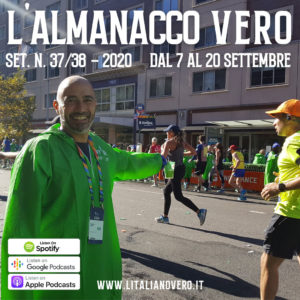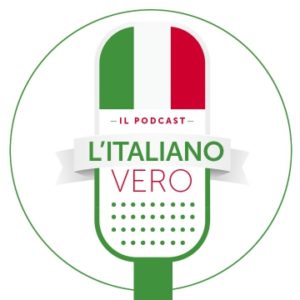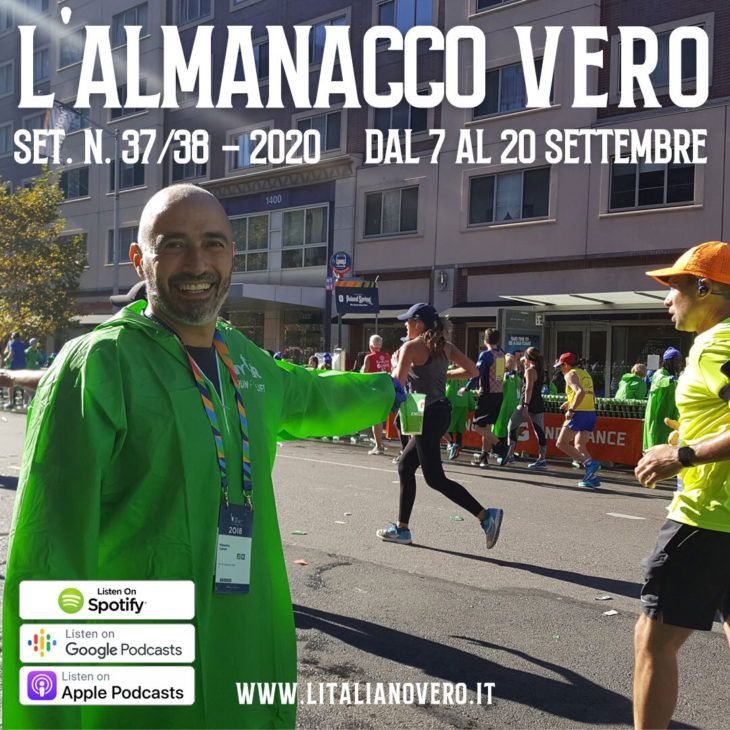L’almanacco Vero – sett. 37-38 (7 al 20 Settembre)

Blog in italiano – tempo di lettura: 5 min
Blog in English – reading time: 5 min
Blog in italiano
________________
Ciao a tutti, cari ascoltatori, in queste ultime settimane ci siamo resi conto che, con la frequenza settimanale dell’almanacco, abbiamo fatto il passo più lungo della gamba (abbiamo cioè tentato un’impresa al di sopra delle nostre possibilità) e abbiamo deciso di renderlo a frequenza bisettimanale, in modo da avere il tempo di curare di più ogni cosa! Da questa settimana quindi pubblicheremo una registrazione a settimana che alternerà l’almanacco vero agli episodi standard.
Anche oggi abbiamo il piacere di dare il benvenuto a tre nuovi Patron: ringraziamo Heather dalla Scozia, Matt dagli Stati Uniti e Berthold da Lipsia.
Ora faccio “uso privato di servizio pubblico”😉 e mando un bacio alle mie nipotine Sofia e Bianca che con il loro balletto, fatto sulle note del nostro jingle, sono ufficialmente scritturate nel podcast per quando “ce ne andremo in pensione” Michela ed io!
7 settembre
1893 Nasce il Genoa: A Genova, nasce la prima squadra di calcio italiana: il Genoa che quindi tra le squadre italiane ha il primato di essere quella con l’atto costitutivo più antico. La sua città, Genova, la ricordiamo quando dobbiamo fare lo spelling delle parole che contengono la G e diciamo G di Genova. La squadra rivale è la Sampdoria, altra squadra genovese, che milita sempre in serie A e con la quale ogni anno si sfida nel “derby della lanterna”, così chiamato perché il faro (chiamato appunto lanterna) è uno dei simboli di questa importante città portuale.
1822 Indipendenza del Brasile: il 7 settembre del 1822 il Brasile dichiara la sua indipendenza dal Portogallo, dopo quasi tre secoli di colonialismo. Il Brasile si costituisce prima come monarchia costituzionale, per poi diventare una Repubblica nel 1889, dopo una rivoluzione pacifica che costringe il re ad abdicare.
La ricorrenza nazionale viene celebrata con parate militari, sfilate e discorsi pubblici.
Anche Google ha più volte dedicato i suoi doodle alla Festa dell’Indipendenza del Brasile.
Buona Festa dell’Indipendenza a tutti i nostri numerosi followers brasiliani!
8 settembre
1925 Nasce lo scotch: A inventarlo è un impiegato statunitense, Richard Drew, nel tentativo di migliorare il precedente nastro adesivo dopo che un cliente si era lamentato con lui per aver lesinato sulla quantità di sostanza adesiva e aveva apostrofato i capi dell’azienda come “scozzesi” (in inglese, “scotch“), considerati avari. Di qui la scelta del nome per il nuovo prodotto!
E’ risaputo che l’espressione “Non fare lo scozzese!” (Heather ci perdonerà!) significa appunto “non essere taccagno”, ma ne abbiamo anche una versione “nostrana”: “Non fare il genovese!” (che per noi italiani sono i più tirchi). Noi italiani veri usiamo con lo stesso significato anche l’espressione “non fare il braccino”, perchè chi è avaro tiene ben strette le braccia per non aprire la borsa o non arrivare al fondo della tasca che contiene i soldi, l’origine di questo modo di dire deriva dal fatto che in passato la stoffa spesso veniva venduta “a braccia” dove il braccio era quello del venditore il quale, se disonesto, lo “accorciava” di proposito per guadagnare di più.
La parola scotch è usata in senso figurato nell’espressione “questa cosa è tenuta insieme con lo scotch” (o anche “con lo sputo”) per indicare qualcosa che cade a pezzi, che è vecchia e non durerà a lungo).
11 settembre
2001 Attentato alle Torri gemelle: Alle 8,46 un volo dell’American Airlines 11 finisce la sua corsa contro la Torre nord del World Trade Center, tra il 93° e il 99° piano di uno dei più alti edifici mai costruiti. Alle 9,03 segue una seconda esplosione: un secondo aereo colpisce la torre sud fra il 77º e l’85º piano.
Quel giorno il mondo ha scoperto la bestialità del terrorismo e a dovuto farne i conti…Al loro posto oggi c’è un memoriale bellissimo e suggestivo, luogo di ricordo e riflessione.
Vi consigliamo un video-documentario molto toccante dal titolo “Gli italiani nelle torri”, in cui quattro italiani sopravvissuti ripercorrono quei drammatici momenti. Il filmato inizia con uno dei protagonisti che dice: “Camminavo e pensavo a quanto è bella la vita!”.
E’ un pensiero bellissimo ma difficile da perseguire sempre, Massimo cita il libro “Risveglio” in cui l’autore afferma che dobbiamo invertire la visione della nostra vita quando non siamo felici, perché il mondo è sempre bello ma siamo noi ad averne una visione sbagliata; come dice Cubo, a volte abbiamo gli occhiali sbagliati e non riusciamo a mettere a fuoco la bellezza che c’è…dobbiamo cambiare gli occhiali!
13 settembre
1970 – Prima edizione della Maratona di New York (50 anni fa!):
In 127 gareggiarono nella prima Maratona di New York, percorrendo più volte il park Drive di Central Park per un totale di 42195 metri. Nemmeno un centinaio di spettatori assistettero alla gara, portata a termine da solo 55 partecipanti. Il primo fra questi fu lo statunitense Gary Muhrcke (ex vigile del fuoco di New York City).
Da allora la maratona è diventata sempre più importante, tanto da affascinare i podisti di tutto il mondo, oggi si snoda attraverso i cinque grandi distretti della città di New York. È la maratona più partecipata al mondo, e conta ormai più di 50.000 partecipanti.
Anche il nostro Massimo ha partecipato a ben due maratone di New York… (potrei aggiungere in che veste, ma è un trascurabile dettaglio…la copertina di puntata vi suggerisce qualcosa?).
Abbiamo anche dei modi di dire legati alla maratona: Correre/fare la maratona in senso figurato significa fare una sfacchinata, un tour de force; anche per indicare un’attività che si prolunga nel tempo senza interruzioni: fare una maratona televisiva (quando guardiamo una serie completa senza pause) o una maratona di lettura (si leggono senza sosta per diverse ore opere letterarie).
19 settembre
1985 Scomparsa di Italo Calvino: Massimo esempio di intellettuale eclettico, Italo Calvino è stato una figura di primo piano nel panorama letterario e politico del Novecento. Filo conduttore dei suoi scritti è uno spiccato gusto per l’ironia che nasconde un profondo giudizio per la condizione dell’uomo del suo tempo.
La sua produzione ha attraversato diverse fasi: dalle posizioni neorealiste dei primi romanzi, come “Il sentiero dei nidi di ragno” (1947) alle atmosfere fantastiche della splendida trilogia degli antenati, composta da “Il visconte dimezzato“, “Il barone rampante” e “Il cavaliere inesistente”. A partire dalla seconda metà degli anni Settanta si apre una nuova fase, considerata più originale, ancor più sperimentale a cui appartengono “Il castello dei destini incrociati” (1969), “Le città invisibili” (1972), “Se una notte d’inverno un viaggiatore” (1979), “Palomar” (1983).
Con questo è tutto!
Vi salutiamo, ricordandovi che l’almanacco torna tra due lunedì!
by Sara
►Ti piace il nostro podcast? Sostienici al costo di un caffè
senza di voi non ci sarebbe il podcast:
https://www.patreon.com/litalianoveropodcast
►Contattaci per idee su nuovi episodi:
https://www.litalianovero.it/wp/contatti/
►Facebook:
https://www.facebook.com/litalianoveropodcast/
►Instagram:
https://www.instagram.com/litalianoveropodcast/
►YouTube
https://bit.ly/2zvrbOK
Blog in English
________________
Hello everyone, dear listeners, in recent weeks we have realized that, with the weekly frequency of the almanac, we have taken il passo più lungo della gamba (the longest step – that is, we have tried an enterprise beyond our means) and we have decided to make it every two weeks, in order to have more time to take care of everything! Starting this week we will therefore publish only one recording per week that will alternate the real almanac with the standard episodes.
Also today we are pleased to welcome three new Patrons: we thank Heather from Scotland, Matt from the United States and Berthold from Leipzig.
Now I make “private use of public service” 😉 and I send a kiss to my granddaughters Sofia and Bianca who with their dance, done to the tune of our jingle, are officially signed into the podcast for when “we will retire” Michela and I !
September 7
1893 Genoa is born: In Genoa, the first Italian football team is born: Genoa which therefore among the Italian teams has the distinction of being the one with the oldest articles of association. We remember his city, Genoa, when we have to spell the words that contain the G and say G of Genoa. The rival team is Sampdoria, another Genoese team, which always plays in Series A and with which every year they compete in the “derby of the lantern”, so called because the lighthouse (called the lantern) is one of the symbols of this important city port.
September 8
1925 Scotch is born: An American employee, Richard Drew, invented it, in an attempt to improve the previous adhesive tape after a customer complained to him about having skimped on the amount of adhesive substance and had apostrophized company leaders as “scozzesi” (“Scots “- in English,” scotch “), considered stingy. Hence the choice of the name for the new product!
We know that the expression “Non fare lo scozzese!” “Don’t be Scottish!” (Heather will forgive us!) Precisely means “non essere taccagno” (“don’t be stingy”), but we also have a “local” version: “Non fare il genovese!” “Don’t be Genoese!” (whom for us Italians are the most stingy). We real Italians also use the expression “non fare il braccino” (“don’t be a little arm”) with the same meaning, because those who are miserly hold their arms tightly so as not to open the bag or not get to the bottom of the pocket that contains the money, the origin of this idiom derives from the fact that in the past the cloth was often sold “by arms” where the braccio arm was that of the seller who, if dishonest, “shortened” it on purpose to earn more.
The word scotch is used figuratively in the expression “this thing is held together with scotch” (o anche “con lo sputo”) (or even “with spit”) to indicate something that falls apart, that is old and will not last long).
September 11
2001 Attack on the Twin Towers: At 8.46 am, an American Airlines 11 flight ends its run against the North Tower of the World Trade Center, between the 93rd and 99th floors of one of the tallest buildings ever built. At 9.03 a second explosion follows: a second plane hits the south tower between the 77th and 85th floors.
That day the world discovered the bestiality of terrorism and had to deal with it …
In their place today there is a beautiful and evocative memorial, a place of remembrance and reflection.
We recommend a very touching video-documentary entitled “Gli italiani nelle torri” (The Italians in the towers) in which four Italian survivors retrace those dramatic moments. The video begins with one of the protagonists saying: “I was walking and thinking about how beautiful life is!”.
It is a beautiful thought but difficult to always pursue, Massimo quotes the book “Risveglio” (Awakening) in which the author states that we must reverse the vision of our life when we are not happy, because the world is always beautiful but we have a distorted vision of it; as Cubo says, sometimes we have the wrong glasses and we can’t focus on the beauty that is there … so we have to change the glasses!
September 13
1970 – First edition of the New York Marathon (50 years ago!):
127 participants competed in the first New York Marathon, covering Central Park’s Park Drive several times for a total of 42195 meters. Not even a hundred spectators attended the race, and only 55 participants finished it. The first of these was the American Gary Muhrcke (former New York City fireman).
Since then the marathon has become increasingly important, so much so that it fascinates runners from all over the world, today it winds through the five great districts of New York City. It is the most attended marathon in the world, and now has more than 50,000 participants.
Our Massimo also participated in two New York marathons… (I could add in what capacity, but it is a negligible detail… does the cover of the episode suggest something to you?).
We also have idioms related to the marathon: Correre/fare la maratona (Running / doing the marathon) in a figurative sense means fare una sfacchinata, un tour de force (doing a grind, a tour de force); also to indicate an attività che si prolunga nel tempo senza interruzioni (activity that lasts over time without interruption): doing a television marathon (when we watch a complete series without pauses) or a reading marathon (literary works are read non-stop for several hours).
September 19
1985 The passing of Italo Calvino: The greatest example of an eclectic intellectual, Italo Calvino was a leading figure in the literary and political panorama of the twentieth century. The leitmotif of his writings is a strong taste for irony that hides a profound judgment for the condition of the man of his time.
His production has gone through several phases: from the neorealiste neorealist positions of the first novels, such as “Il sentiero dei nidi di ragno“ (“The path of the spider’s nests”) (1947) to the fantastiche (fantastic) atmospheres of the splendid trilogia degli antenati (Ancestors Trilogy), composed of “Il visconte dimezzato“ (“The half-baked viscount”), “Il barone rampante” (“The rampant baron”) and “Il cavaliere inesistente” (“The non-existent knight”). Starting from the second half of the seventies, a nuova fase (new phase) opens, considered more original, even more sperimentale (experimental) to which were added “Il castello dei destini incrociati” (“The castle of crossed destinies” – 1969), “Le città invisibili” (“The invisible cities” -1972), “Se una notte d’inverno un viaggiatore” (“If a night of winter a traveler ” – 1979),” Palomar “(1983).
That’s all we have for now!
We bid you all farewell, reminding you that the almanac will return every other Monday!
English by Kevin (ItalianRocks)
►Did you like the podcast? Please support us at the cost of a coffee
without you there would be no podcast:
https://www.patreon.com/litalianoveropodcast
►Contact us for ideas about new podcasts:
https://www.litalianovero.it/wp/contatti/
►Facebook:
https://www.facebook.com/litalianoveropodcast/
►Instagram:
https://www.instagram.com/litalianoveropodcast/
►YouTube
https://bit.ly/2zvrbOK
L'Italiano Vero è un progetto libero finanziato dagli ascoltatori e dalle ascoltatrici.
- 10 – Le dritte per lavorare in Italia – parte 1
 Settembre 9, 2019
Settembre 9, 2019 24 min
24 min - 09 – Dal parrucchiere
 Luglio 29, 2019
Luglio 29, 2019 13 min
13 min - 08 – Il caffè al bar
 Luglio 15, 2019
Luglio 15, 2019 24 min
24 min - 07 – Ma intendi questo… o il prossimo??
 Luglio 1, 2019
Luglio 1, 2019 15 min
15 min - EPISODIO 06 – Caratteri speciali parte 2
 Giugno 17, 2019
Giugno 17, 2019 21 min
21 min - EPISODIO 05 – Caratteri speciali parte 1
 Maggio 30, 2019
Maggio 30, 2019 29 min
29 min - EPISODIO 04 Facciamo le presentazioni parte 2 – Paolo
 Maggio 9, 2019
Maggio 9, 2019 21 min
21 min - EPISODIO 03 – Spelling parte seconda e..”Sanremo”
 Aprile 30, 2019
Aprile 30, 2019 28 min
28 min - EPISODIO 02 – In bocca al Lupo
 Aprile 17, 2019
Aprile 17, 2019 15 min
15 min - EPISODIO 01 – Facciamo le presentazioni parte prima (il Cubo)
 Aprile 10, 2019
Aprile 10, 2019 24 min
24 min - 00 – Parliamo del più e del meno
 Aprile 3, 2019
Aprile 3, 2019 24 min
24 min
- 20 – Il latino vero con Michela – parte 2
 Gennaio 26, 2020
Gennaio 26, 2020 21 min
21 min - 19 – Il latino vero con Michela – parte 1
 Gennaio 12, 2020
Gennaio 12, 2020 20 min
20 min - 18 – Parenti serpenti?
 Dicembre 29, 2019
Dicembre 29, 2019 24 min
24 min - 17 – Italiani veri a Firenze
 Dicembre 15, 2019
Dicembre 15, 2019 21 min
21 min - 16 – Niente di niente
 Dicembre 1, 2019
Dicembre 1, 2019 12 min
12 min - 15 – La dolce vita con Linda
 Novembre 17, 2019
Novembre 17, 2019 min
min - 14 – Un Pinco Pallino qualsiasi
 Novembre 3, 2019
Novembre 3, 2019 20 min
20 min - 13 – L’avvocato del diavolo
 Ottobre 20, 2019
Ottobre 20, 2019 14 min
14 min - 12 – L’uomo del tempo
 Ottobre 7, 2019
Ottobre 7, 2019 9 min
9 min - 11 – Le dritte per lavorare in Italia – parte 2
 Settembre 23, 2019
Settembre 23, 2019 33 min
33 min
- Gli otto Re di Roma con Marco Cappelli – episodio bonus
 Gennaio 9, 2024
Gennaio 9, 2024 6 min
6 min - Flash! 009 Ed è Gol con Antonino Palumbo
 Dicembre 2, 2022
Dicembre 2, 2022 31 min
31 min - Flash! 008 Faccia da funerale
 Ottobre 8, 2022
Ottobre 8, 2022 18 min
18 min - 1 2 3… Grazie Patrons!
 Dicembre 25, 2021
Dicembre 25, 2021 1 min
1 min - Flash! 007 Le vacanze degli Italiani Veri
 Settembre 18, 2021
Settembre 18, 2021 21 min
21 min - Flash! 006 Paolo medaglia di legno
 Agosto 14, 2021
Agosto 14, 2021 17 min
17 min - Flash – C’è da spostare una macchina
 Maggio 4, 2020
Maggio 4, 2020 32 min
32 min - Flash – Italiani veri a Bergamo
 Aprile 12, 2020
Aprile 12, 2020 41 min
41 min - Flash! 003 la mia dolce metà
 Agosto 26, 2019
Agosto 26, 2019 18 min
18 min - Flash! 002 nel traffico
 Agosto 12, 2019
Agosto 12, 2019 11 min
11 min - Flash! Italiani veri a Roma
 Giugno 5, 2019
Giugno 5, 2019 9 min
9 min







Leave a Comment